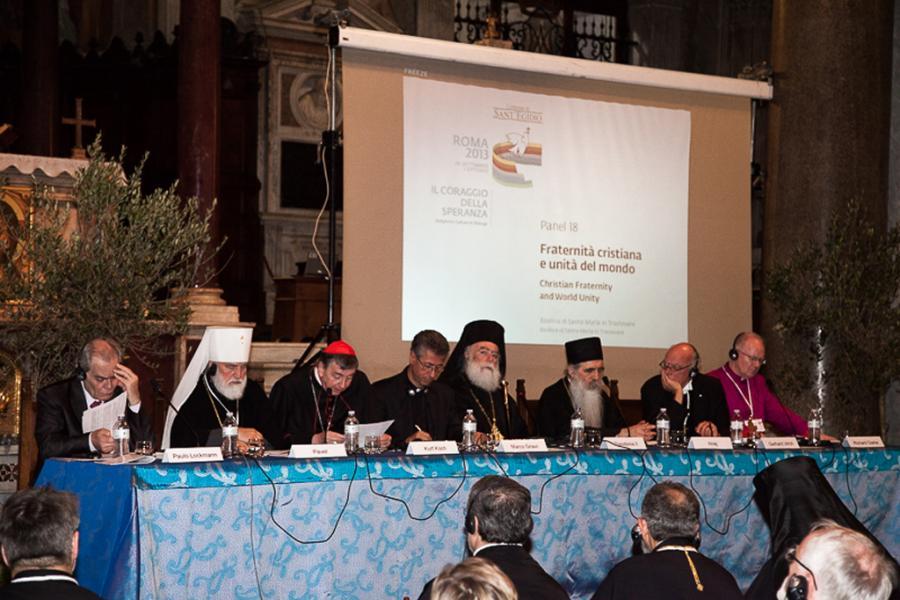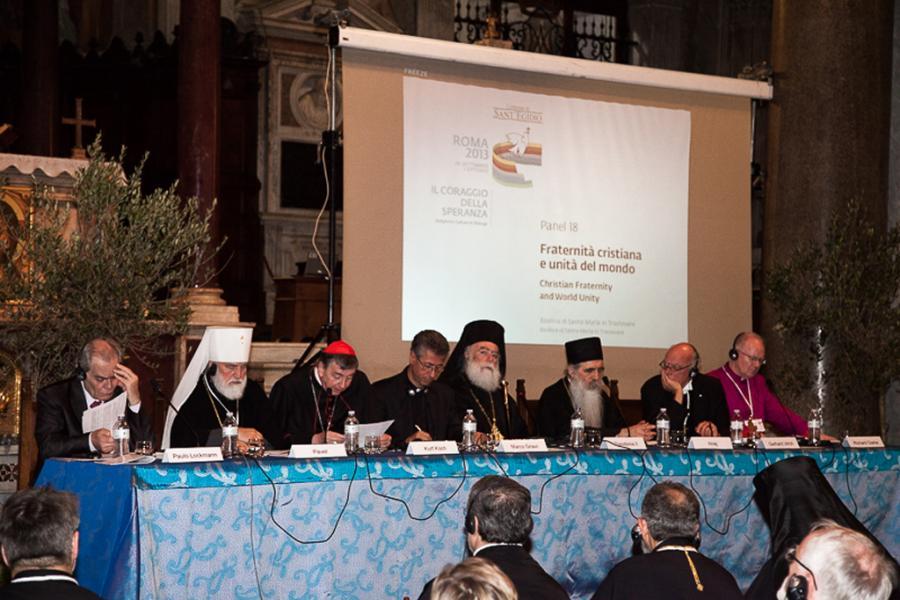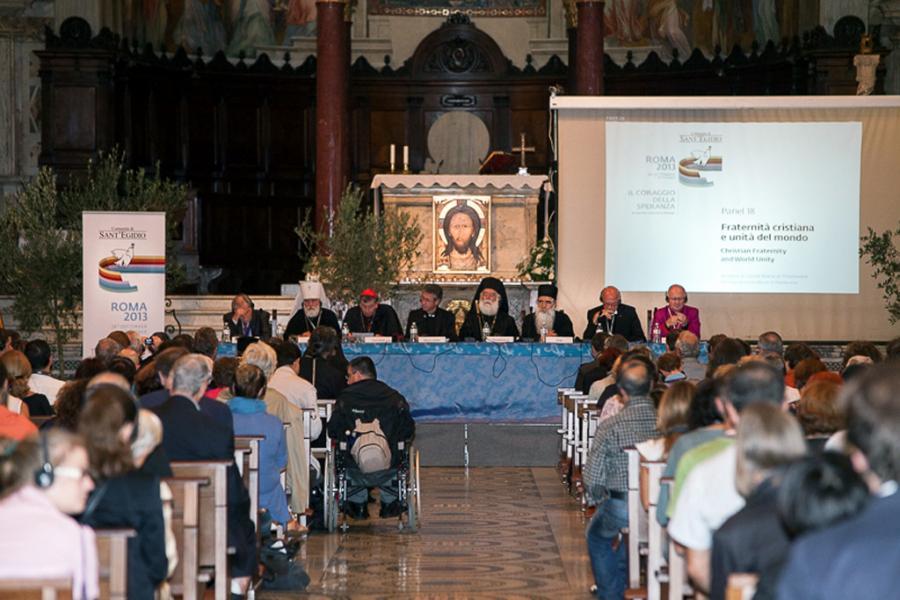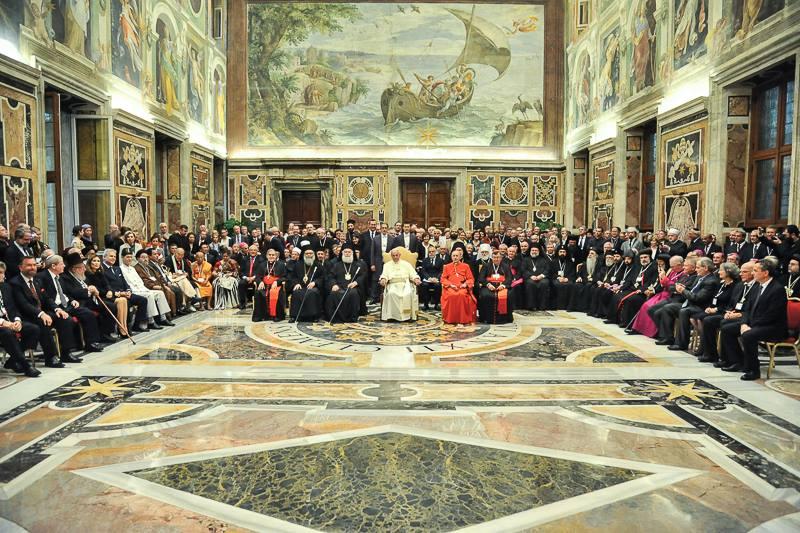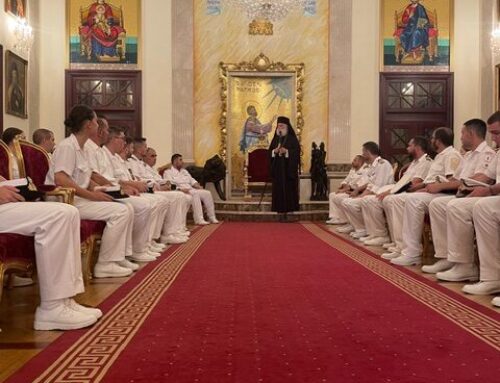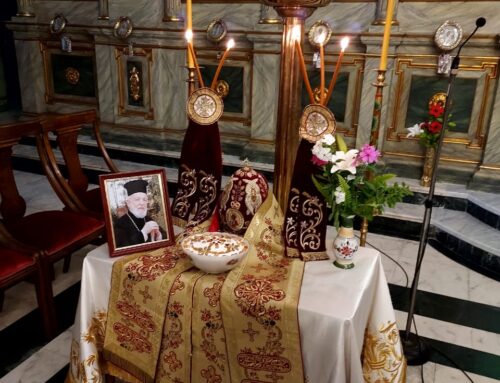On the afternoon of Monday 30th September 2013, His Beatitude Theodoros II, Pope and Patriarch of Alexandria and All Africa, responding to an invitation from the Community of St Egidio, took part in a discussion on the topic Christian Brotherhood and Unity, which took place in the Basilica di Santa Maria in Trastevere in Rome. This event is included in the meeting organized by the Community of St Egidio in Rome, under the title of The Courage of Hope, the opening of the deliberations of which the Primate of the Roman Catholic Church Francis I declared earlier that same day.
In his address His Beatitude noted the following:
“A city with nothing holy and with godless people……does not exist and you can never find one” (Plutarch, To Kolotis Epicure 31). In the twilight of the second millennium there were many who predicted the end of religion and the entry of humanity into an age of no religion. However, today at the dawn of the third millennium, in support of Plutarch’s principle and in refutation of the prophecy concerning the end of the religious phase of humanity, religion comes forward again as a constant in human existence.
Against the existential void, the loss of the meaning of life, chaotic information, conflicting blissful proposals and extreme experimentations between man and himself, religion continues to offer the ever-wandering and destitute people of the 21st century existential guidance, a meaning of life, moral conscience, cultural identity, the prospect for eternal salvation. It offers mankind the ability to understand itself fully only by starting with God as the Creator, Beginning and Source of the world; the God of all nations and people; the God of Love, of Providence and of Salvation ”according to the multitude of His mercies” for all His creation.
We would expect that the present global revival of religion to become an agent of peacemaking and a re-enforcer of the struggle for justice and dignity. However, we observe that religious self-identification often proves to be an agent of discord and intolerance, fanaticism and violence. This occurs when religious conscience is manipulated, religious specificity is misunderstood, religious zealotism denies freedom to others in the name of God. Religion is besieged and is sometimes seized by powers of messianism, totalitarianism, chauvinism, tribalism, ideological exclusivity, fundamentalism.
Before us the specter of the conflict of civilizations, whose main attributive feature is religion, rises before us menacingly. This prospect would be catastrophic today when globally human societies have finally bid farewell to dominant cultural identity and have accepted the challenge not only of co-existence, but also the activities of disparate cultural identities. There is no society today which does not include people of differing cultural roots, with different opinions about the relations between God and man, individual and group, rights and responsibilities, freedom and authority, equality and hierarchy.
Indeed, today religion differentiates man’s behavior more even than national identity. If we walk today through Rome it is possible that we will meet people who declare that they are half Italian and half Arab. However, we will not meet people who will say they are half Roman Catholic and half Muslim.
So rather than religion becoming an agent of fission, but a relationship between people, we are faced with a responsibility expectation of global dimension: to substantially and productively contribute to the dialogue between the various religious traditions. The starting point of such a dialogue should be the promotion of the elements which unite religions, rather than those that divide them. The starting point of such a dialogue should be the promotion of the common principles of the various religions, rather than those perceptions of religious superiority which undermine tolerance of diversity. The aim of such a dialogue should be to highlight the unifying and peacemaking operation of religions. The aim of such a dialogue should be the consensus of religions on a common minimum ethic, without distortion of the faith.
Certainly, our intentions, as genuine as they are, will not be transformed into actions unless we ourselves as representatives of the Orthodox, Roman Catholic and Protestant Churches, first give the example of unity through diversity, as a pre-figuration of the need for peaceful co-existence of the faithful of the various religions.
Our presence here today attests to the need for mutual respect. This respect does not mean either acceptance of the dogmatic teaching of one church by another, neither the confirmation of this teaching as true. It means receptiveness of the other as a created and relative being who is making a concerted effort to approach and experience the truth of life in Christ. It means the acceptance of the power of the Church as the body of Christ not to conform to the world, but rather to reform the world.
I am well aware that some argue fearfully that the inter-denominational and inter-religious dialogue discolour religious specificity and favours syncretism. They are however unable to comprehend that man and religious faith have inseparably coexisted since the beginning of time. They are unable to comprehend that religious faith was never deleted from the existential identity of people and nations, even though many tried to achieve this through the ages. They are unable to comprehend that which I ascertain daily in my pastoral duties in Africa, that mosaic of nations and people; that faith in God is the only constant in a world which is dangerously adrift.
The problem is not religious pluralism, but our attitude towards it. If fear prevails over religious diversity, we will then inevitably lead to encapsulation into our own community and to risky absolutism.
However, if religious pluralism flourishes on the ground of a broader evaluative con-census between religions, then we will avoid both the oblivion of truth as well as the fanaticism of truth.
It is time to teach our faithful not only to remain true to their tradition and to preserve their constitutive identity, but also to be open to what is different and to nourish respect for another’s religion, firstly because they themselves have a religion. It is time to teach our faithful that absolutism of specificity does not constitute preservation of truth, but rather distorts truth and slides towards an exclusivity neurosis born of religion.
This is the message which I bring you from the Middle East, where for two millennia, between a rock and a hard place, we experience faith in the God of Love as a resurrectional hope and ministry, a struggle for justice and peace.




